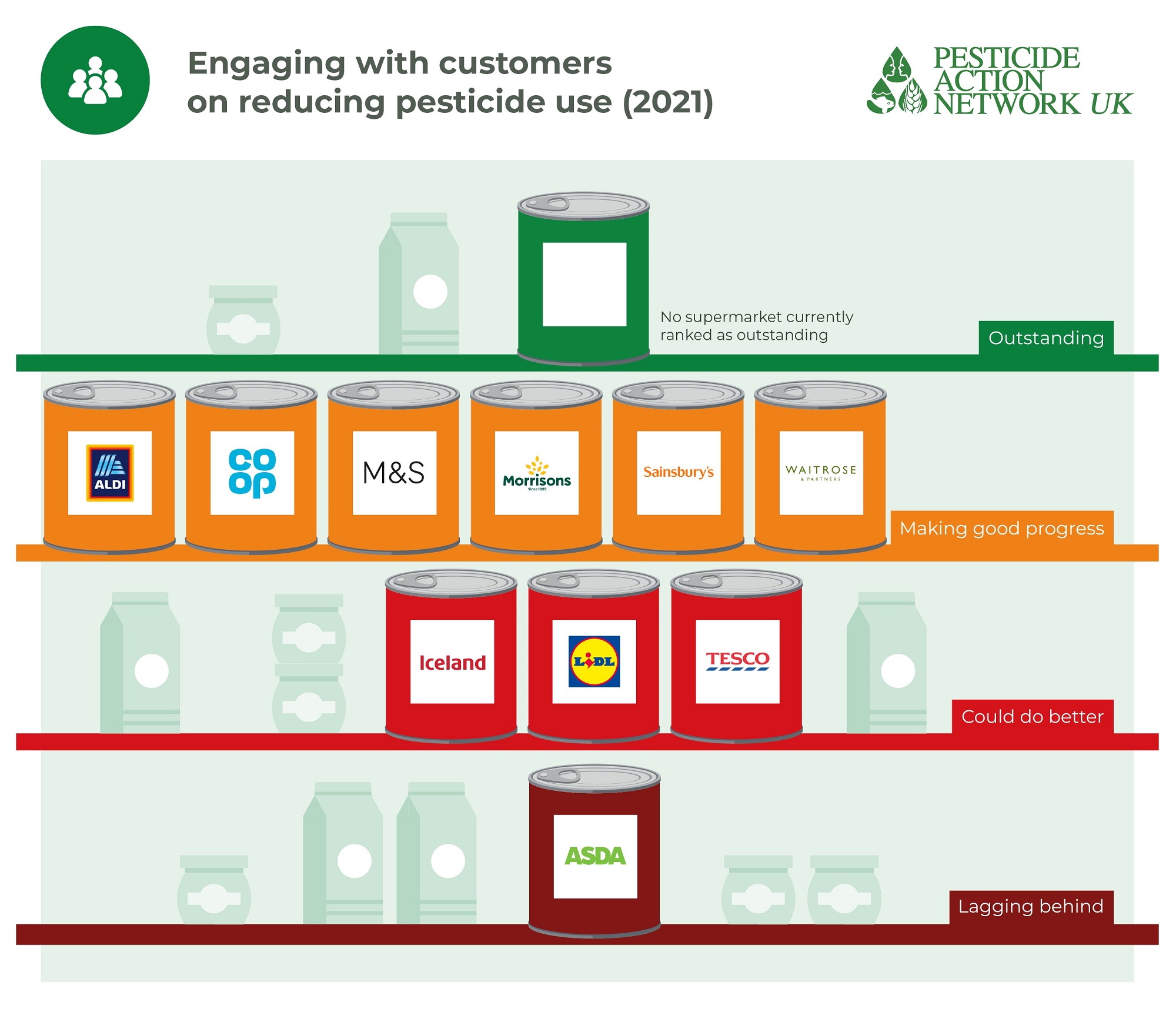
UK shoppers have come to expect a limitless supply of ‘perfect’ fruit and vegetables all year round. However, the majority of shoppers aren’t aware of the links between these expectations and pesticide use. This is why supermarkets have a big role to play in educating their customers on how they can help the company to reduce pesticide use in their supply chains. The three key areas are:
a) Cosmetic pesticide use
A huge amount of pesticide use is aimed at providing us with blemish-free fruit and vegetables which conform to our idea of the ‘perfect’ size and shape. In fact, supermarkets will sometimes refuse to buy fresh produce which is in some way marked or shaped differently. Given that many farmers struggle to be profitable, this can drive them to use pesticides on their crop long before a problem actually emerges but simply to ensure that as much of their produce as possible will be purchased.
UK supermarkets have made some progress in this area in recent years. For example, most supermarkets now sell their own ‘wonky’ range of fruit and vegetables, and some have started using imperfect produce in their ready meals. However, as a sector, UK supermarkets could be doing much more, particularly on helping shoppers to understand the broader environmental and social benefits of choosing to buy imperfect produce.

WHAT CAN I DO?
Tell your supermarket you don’t mind buying imperfect fruit and vegetables, in fact you want to! When you are selecting your fruit and vegetables pick the imperfect ones. If your supermarket has a specific area selling imperfect fruit and vegetables, buy from it as much as possible.
b) Seasonality
Supermarkets provide a wide range of fresh produce all year round. As a result, UK shoppers have become used to buying whatever fruit and vegetables they might want, regardless of the season. But this endless choice comes at a high price. The only way a supermarket is able to offer (for example) strawberries in December is by importing them. This lengthens supply chains, increasing the need to use fungicides which prevent fresh produce from rotting while they are being transported. Imports will also often come from countries with weaker pesticide standards than the UK and may have been grown using Highly Hazardous Pesticides which are banned for use here.
The majority of UK supermarkets told PAN UK that they do encourage their customers to accept that not all fresh produce items will be available all year round. However, as a sector, supermarkets could certainly be doing more to promote produce that is grown locally and in season and encourage shoppers to buy it.

WHAT CAN I DO?
Try to only buy fruit and vegetables that are in season and have been grown as locally as possible. Tell your supermarket that you don’t expect the full range of fresh produce to be available all year round and that it’s more important to you that they reduce pesticide use in their supply chains. For produce such as oranges, bananas or rice that can’t be grown in the UK, do try and buy organic or Fairtrade whenever possible.
c) Accepting the odd bug in fresh produce
As a result of widespread pesticide use in agriculture we have become used to our fruit and vegetables being entirely ‘bug-free’. This is because pesticides – and in particular insecticides – don’t only kill the living things they are targeted at but can kill all insects which come into contact with them. Supermarkets often receive complaints and requests for refunds if shoppers come across an insect in their fresh produce. However, what most shoppers don’t know is that finding an insect could be a sign that a crop hasn’t been drenched in pesticides.
In fact, a good way for farmers to reduce pesticide use is through encouraging populations of ‘natural enemies’ which are insects that help to keep pests under control. While this reduces the need to use pesticides, it also increases the likelihood of finding a bug in your lettuce (for example). If we want UK supermarkets to reduce pesticide use in their supply chains, then we must change our mind set to see a limited amount of bugs in fruit and vegetables as a positive thing.
More than half of UK supermarkets are now actively encouraging their customers to accept that they may occasionally find a ‘bug’ in fresh produce they buy. Whilst this has increased since 2019, given that this is a key obstacle to reducing pesticide use, PAN UK would like to see all supermarkets proactively educating shoppers to embrace finding the odd insect among their fruit or vegetables.

WHAT CAN I DO?
Tell your supermarket that you don’t mind finding bugs in fresh produce. If you do find a bug in fruit or vegetables that you have bought, why not go to the customer service desk next time you’re in store and tell them how happy you are about it! This will help to counter the complaints they receive.










